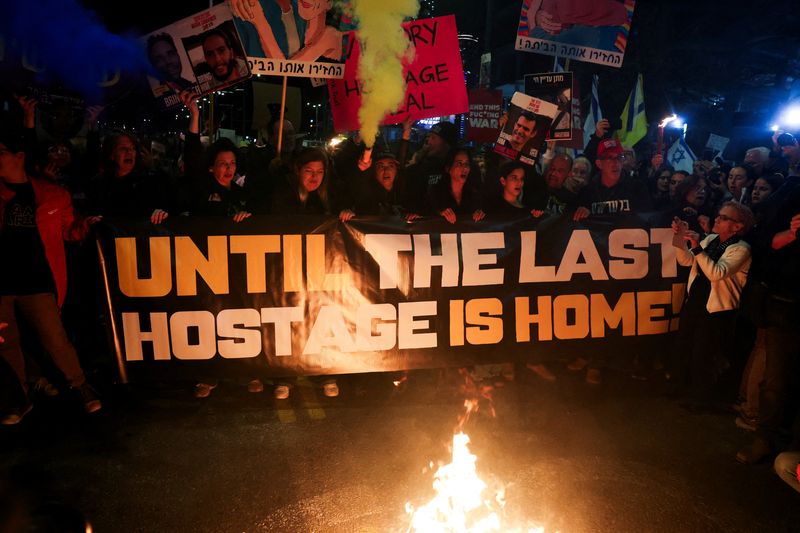
Written by Maayan Lubel and Nidal al-Mughrabi
JERUSALEM/CAIRO (Reuters) – A ceasefire in the Gaza Strip between Israel and the Islamic Resistance Movement (Hamas) is scheduled to take effect on Sunday morning, with the hostages to be released hours later, opening the way to a possible end to the 15-month-old war. It turned the situation upside down. The Middle East.
The agreement came after months of intermittent negotiations mediated by Egypt, Qatar and the United States, and came ahead of the inauguration of US President-elect Donald Trump on January 20.
The three-stage ceasefire will go into effect at 0630 GMT on Sunday.
The first phase will last six weeks, during which 33 of the remaining 98 hostages – women, children, men over 50, the sick and wounded – will be released in exchange for the release of nearly 2,000 Palestinian prisoners and detainees.
They include 737 male and female prisoners and teenagers, some of whom are members of armed groups convicted of attacks that killed dozens of Israelis, as well as hundreds of Palestinians from Gaza who have been detained since the beginning of the war.
It is expected that three hostages will be released on Sunday afternoon through the Red Cross, in exchange for the release of 30 prisoners for each of them.
After the hostages were released on Sunday, chief US negotiator Brett McGurk said the agreement called for the release of four more hostages after seven days, followed by the release of three more hostages every seven days after that.
US President Joe Biden's team worked closely with Trump's Middle East envoy Steve Witkoff to push the deal further.
As his inauguration approached, Trump repeated his demand for the deal to be concluded quickly, repeatedly warning that there would be “hell to pay” if the hostages were not released.
Gaza after the war?
But what will happen next in Gaza remains unclear in the absence of a comprehensive agreement on the future of the Strip after the war, which will require billions of dollars and years of work to rebuild.
Although the ceasefire's stated goal is to end the war completely, it could easily collapse.
Hamas, which controlled Gaza for nearly two decades, has managed to survive despite losing its senior leadership and thousands of fighters.
Israel has pledged that it will not allow Hamas to return to power and has cleared large swaths of territory inside Gaza, in a move widely seen as a move toward creating a buffer zone that would allow its forces to act freely against threats in the Strip.
In Israel, the return of the hostages may ease some of the public anger against Prime Minister Benjamin Netanyahu and his right-wing government over the October 7 security failure that led to the bloodiest day in the country's history.
But the hard-liners in his government have already threatened to resign if the war on Hamas is not resumed, leaving him sandwiched between Washington's desire to see an end to the war, and his far-right political allies at home.
If the war resumes, dozens of hostages could be left in Gaza.
Shock waves in the Middle East
Outside Gaza, the war has sent shockwaves across the region, sparking a war with the Tehran-backed Lebanese Hezbollah and putting Israel in direct conflict with arch-rival Iran for the first time.
More than a year later, the Middle East has changed. Iran, which has spent billions building a network of militant groups around Israel, has seen its “axis of resistance” destroyed and has been unable to inflict more than minimal damage on Israel in two major missile attacks.
Hezbollah, whose massive missile arsenal was once seen as Israel's greatest threat, has been humbled, with its senior leadership killed and most of its missiles and military infrastructure destroyed.
In the aftermath, the decades-long Assad regime in Syria was overthrown, removing another key Iranian ally and leaving the Israeli military virtually unchallenged in the region.
But on the diplomatic front, Israel has faced anger and isolation over the death and destruction in Gaza.
Netanyahu faces an arrest warrant from the International Criminal Court over allegations of war crimes and separate charges of genocide at the International Court of Justice.
Israel reacted angrily to both cases, dismissing the charges as politically motivated and accusing South Africa, which brought the original case to the International Court of Justice, as well as the countries that joined it, of anti-Semitism.
The war was sparked by an October 7, 2023 Hamas attack on southern Israel in which 1,200 people were killed and more than 250 were taken hostage, according to Israeli statistics. More than 400 Israeli soldiers have been killed in fighting in Gaza since then.

Israel's 15-month campaign in Gaza has killed nearly 47,000 Palestinians, according to figures from the Gaza Health Ministry, which does not distinguish between combatants and civilians, and has left the narrow coastal enclave a wasteland of rubble.
Health officials say most of the dead were civilians. Israel says more than a third of them are fighters.





